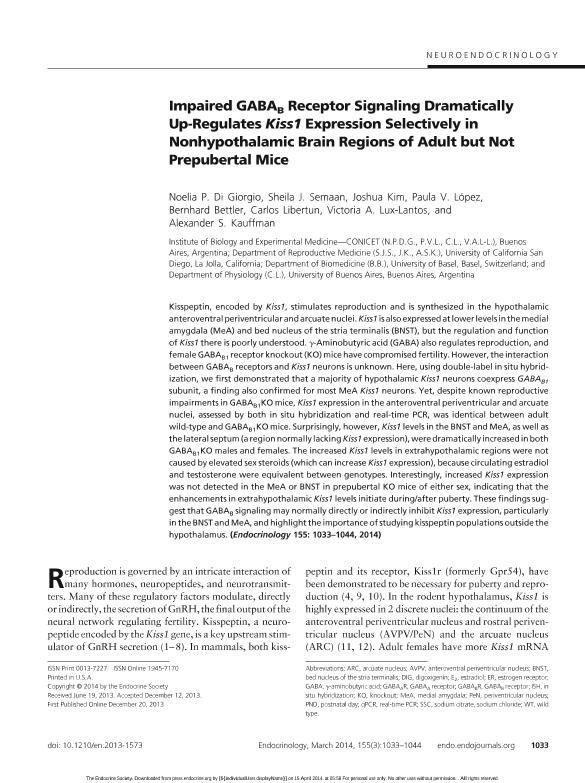Artículo
Impaired GABAB receptor signaling dramatically up-regulates Kiss1 expression selectively in nonhypothalamic brain regions of adult but not prepubertal mice
Di Giorgio, Noelia Paula ; Semaan, Sheila J.; Kim, Joshua; Lopez, Paula Veronica
; Semaan, Sheila J.; Kim, Joshua; Lopez, Paula Veronica ; Bettler, Bernhard; Libertun, Carlos
; Bettler, Bernhard; Libertun, Carlos ; Lux, Victoria Adela R.
; Lux, Victoria Adela R. ; Kauffman, Alexander S.
; Kauffman, Alexander S.
 ; Semaan, Sheila J.; Kim, Joshua; Lopez, Paula Veronica
; Semaan, Sheila J.; Kim, Joshua; Lopez, Paula Veronica ; Bettler, Bernhard; Libertun, Carlos
; Bettler, Bernhard; Libertun, Carlos ; Lux, Victoria Adela R.
; Lux, Victoria Adela R. ; Kauffman, Alexander S.
; Kauffman, Alexander S.
Fecha de publicación:
03/2014
Editorial:
Endocrine Society
Revista:
Endocrinology
ISSN:
0013-7227
e-ISSN:
1945-7170
Idioma:
Inglés
Tipo de recurso:
Artículo publicado
Clasificación temática:
Resumen
Kisspeptin, encoded by Kiss1, stimulates reproduction and is synthesized in the hypothalamic anteroventral periventricular and arcuate nuclei. Kiss1 is also expressed at lower levels in the medial amygdala (MeA) and bed nucleus of the stria terminalis (BNST), but the regulation and function of Kiss1 there is poorly understood. γ-Aminobutyric acid (GABA) also regulates reproduction, and female GABAB1 receptor knockout (KO) mice have compromised fertility. However, the interaction between GABAB receptors and Kiss1 neurons is unknown. Here, using double-label in situ hybridization, we first demonstrated that a majority of hypothalamic Kiss1 neurons coexpress GABAB1 subunit, a finding also confirmed for most MeA Kiss1 neurons. Yet, despite known reproductive impairments in GABAB1KO mice, Kiss1 expression in the anteroventral periventricular and arcuate nuclei, assessed by both in situ hybridization and real-time PCR, was identical between adult wild-type and GABAB1KO mice. Surprisingly, however, Kiss1 levels in the BNST and MeA, as well as the lateral septum (a region normally lacking Kiss1 expression), were dramatically increased in both GABAB1KO males and females. The increased Kiss1 levels in extrahypothalamic regions were not caused by elevated sex steroids (which can increase Kiss1 expression), because circulating estradiol and testosterone were equivalent between genotypes. Interestingly, increased Kiss1 expression was not detected in the MeA or BNST in prepubertal KO mice of either sex, indicating that the enhancements in extrahypothalamic Kiss1 levels initiate during/after puberty. These findings suggest that GABAB signaling may normally directly or indirectly inhibit Kiss1 expression, particularly in the BNST and MeA, and highlight the importance of studying kisspeptin populations outside the hypothalamus.
Palabras clave:
Gabab
,
Kiss1
,
Signaling
,
Brain
Archivos asociados
Licencia
Identificadores
Colecciones
Articulos(IBYME)
Articulos de INST.DE BIOLOGIA Y MEDICINA EXPERIMENTAL (I)
Articulos de INST.DE BIOLOGIA Y MEDICINA EXPERIMENTAL (I)
Citación
Di Giorgio, Noelia Paula; Semaan, Sheila J.; Kim, Joshua; Lopez, Paula Veronica; Bettler, Bernhard; et al.; Impaired GABAB receptor signaling dramatically up-regulates Kiss1 expression selectively in nonhypothalamic brain regions of adult but not prepubertal mice; Endocrine Society; Endocrinology; 155; 3; 3-2014; 1033-1044
Compartir
Altmétricas



